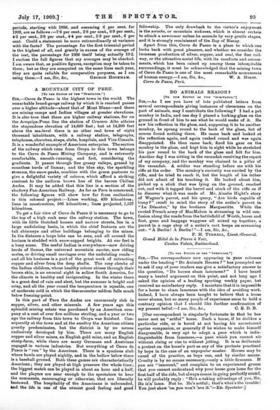' [To THE EDITOR OF THE "SPECTATOR."] SIR, — The correspondence now
appearing in your columns under the heading "Do Animals Reason P" has prompted me to ask if any of-your readers can give a satisfactory answer to the question, "Do horses sham lameness ?" I have heard many a heated argument on this point, and not long ago I asked the opinion of a leading sporting weekly paper, but received no satisfactory reply. I maintain that it is impossible for a horse to sham lameness with the idea of avoiding work. Indeed, I have always been taught to believe that a horse never shams, but so many people of experience seem to hold a contrary opinion that I should like further confirmation of
my present belief.—I am, Sir, Ste., C. E. D. B.
[Our correspondent is singularly fortunate in that he has never met an "artful" horse. Such a horse, if be dislikes a particular ride, or is bored at not having his accustomed equine companion, or generally if he wishes to make himself disagreeable, is very apt to adopt a pace :which is indis- tinguishable from lameness,—a pace which you cannot sit-, without rising or rise to without jolting. It is as deliberate a protest on the horse's part as any of the protests practised by boys in the case of an unpopular master. Horses may be cured of the practice, as boys can, and by similar means. Cruelty iá by no means necessary,—only a little firmness. If you are "innocent," and complain to an experienced groom that you cannot understand why your horse goes lame for the first half of the ride, but always comes in going perfectly sound, he will probably reply : "He's a-taking advantage of you, Sir. He is'n' lame. Not he. He's artful ; that's what's the trouble! Yon just show 'im you won't 'ave it."—ED. Spectator.]








































 Previous page
Previous page